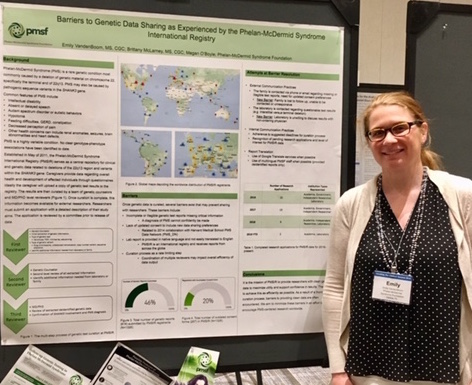
By Emily VandenBoom
PMSF Registry Coordinator/Genetic Counselor
I had the pleasure of representing the Phelan-McDermid Syndrome Foundation at the annual Curating the Clinical Genome Conference held May 29-31 in Washington, DC. This conference brings together researchers, clinicians and laboratories in hopes of better understanding our genetic makeup, with the ultimate goal of providing better care for the individual patient.
In today’s world, we can sequence an individual’s entire genome (or read each letter of the DNA held within their cells) using a small sample of blood or saliva. This type of testing has provided a diagnosis of PMS for many families whose children were found to have a spelling error within the SHANK3 gene. The SHANK3 gene, however, is just one of about 20,000 genes in our body. And while this testing has provided some families with answers, it also has the potential to result in more questions than answers for others. That is to say, although we can read each letter of an individual’s DNA, we do not yet understand how to fully interpret it. There are thousands of genes within our body whose function or purpose remains a mystery. It is only when research and genetic test results are meaningfully combined that we will better understand which genes are associated with disease, what types of genetic spelling errors affect gene function, and how we can use this information to improve patient care. This process takes participation and commitment from patients, caregivers, health professionals, laboratory scientists and researchers alike. The mission of the Curating the Clinical Genome Conference is to identify best practices to keep this process moving forward.
PMSF was a stand-out amongst rare disease organizations represented at the conference. I presented a poster titled “Barriers to Genetic Data Sharing as Experienced by the Phelan-McDermid Syndrome International Registry” to highlight some of the ways we can continue to improve collaboration between rare disease registries and researchers. With the ongoing support of our dedicated families, we are proud to keep PMS at the forefront of genetics research as the field continues to rapidly evolve.
